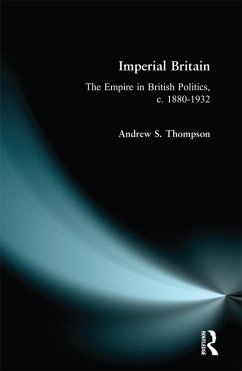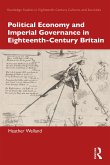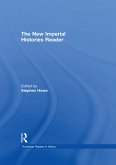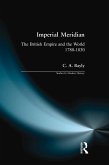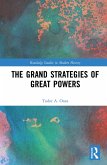50,95 €
50,95 €
inkl. MwSt.
Sofort per Download lieferbar

25 °P sammeln
50,95 €
Als Download kaufen

50,95 €
inkl. MwSt.
Sofort per Download lieferbar

25 °P sammeln
Jetzt verschenken
Alle Infos zum eBook verschenken
50,95 €
inkl. MwSt.
Sofort per Download lieferbar
Alle Infos zum eBook verschenken

25 °P sammeln
- Format: PDF
- Merkliste
- Auf die Merkliste
- Bewerten Bewerten
- Teilen
- Produkt teilen
- Produkterinnerung
- Produkterinnerung

Bitte loggen Sie sich zunächst in Ihr Kundenkonto ein oder registrieren Sie sich bei
bücher.de, um das eBook-Abo tolino select nutzen zu können.
Hier können Sie sich einloggen
Hier können Sie sich einloggen
Sie sind bereits eingeloggt. Klicken Sie auf 2. tolino select Abo, um fortzufahren.

Bitte loggen Sie sich zunächst in Ihr Kundenkonto ein oder registrieren Sie sich bei bücher.de, um das eBook-Abo tolino select nutzen zu können.
This major new study considers the impact of the empire upon modern British political culture. The economic and cultural legacy of empire have received a great deal of attention, but historians have neglected the effects of empire upon the domestic British political scene. Dr Thompson explores economic, demographic, intellectual and military influences and he shows how parliamentary and party opinion interacted with imperial ideas and interests in the country at large.
- Geräte: PC
- mit Kopierschutz
- eBook Hilfe
- Größe: 5.23MB
Andere Kunden interessierten sich auch für
![Political Economy and Imperial Governance in Eighteenth-Century Britain (eBook, PDF) Political Economy and Imperial Governance in Eighteenth-Century Britain (eBook, PDF)]() Heather WellandPolitical Economy and Imperial Governance in Eighteenth-Century Britain (eBook, PDF)40,95 €
Heather WellandPolitical Economy and Imperial Governance in Eighteenth-Century Britain (eBook, PDF)40,95 €![The New Imperial Histories Reader (eBook, PDF) The New Imperial Histories Reader (eBook, PDF)]() The New Imperial Histories Reader (eBook, PDF)46,95 €
The New Imperial Histories Reader (eBook, PDF)46,95 €![Diplomatic Identity in Postwar Britain (eBook, PDF) Diplomatic Identity in Postwar Britain (eBook, PDF)]() James SouthernDiplomatic Identity in Postwar Britain (eBook, PDF)41,95 €
James SouthernDiplomatic Identity in Postwar Britain (eBook, PDF)41,95 €![Imperial Meridian (eBook, PDF) Imperial Meridian (eBook, PDF)]() C. A. BaylyImperial Meridian (eBook, PDF)96,95 €
C. A. BaylyImperial Meridian (eBook, PDF)96,95 €![Oil for Britain (eBook, PDF) Oil for Britain (eBook, PDF)]() Jonathan KuikenOil for Britain (eBook, PDF)42,95 €
Jonathan KuikenOil for Britain (eBook, PDF)42,95 €![Refugees and Cultural Transfer to Britain (eBook, PDF) Refugees and Cultural Transfer to Britain (eBook, PDF)]() Refugees and Cultural Transfer to Britain (eBook, PDF)46,95 €
Refugees and Cultural Transfer to Britain (eBook, PDF)46,95 €![The Grand Strategies of Great Powers (eBook, PDF) The Grand Strategies of Great Powers (eBook, PDF)]() Tudor A. OneaThe Grand Strategies of Great Powers (eBook, PDF)41,95 €
Tudor A. OneaThe Grand Strategies of Great Powers (eBook, PDF)41,95 €-
-
-
This major new study considers the impact of the empire upon modern British political culture. The economic and cultural legacy of empire have received a great deal of attention, but historians have neglected the effects of empire upon the domestic British political scene. Dr Thompson explores economic, demographic, intellectual and military influences and he shows how parliamentary and party opinion interacted with imperial ideas and interests in the country at large.
Dieser Download kann aus rechtlichen Gründen nur mit Rechnungsadresse in A, B, BG, CY, CZ, D, DK, EW, E, FIN, F, GR, HR, H, IRL, I, LT, L, LR, M, NL, PL, P, R, S, SLO, SK ausgeliefert werden.
Produktdetails
- Produktdetails
- Verlag: Taylor & Francis eBooks
- Seitenzahl: 238
- Erscheinungstermin: 30. Juli 2014
- Englisch
- ISBN-13: 9781317882534
- Artikelnr.: 41327369
- Verlag: Taylor & Francis eBooks
- Seitenzahl: 238
- Erscheinungstermin: 30. Juli 2014
- Englisch
- ISBN-13: 9781317882534
- Artikelnr.: 41327369
- Herstellerkennzeichnung Die Herstellerinformationen sind derzeit nicht verfügbar.
Andrew S. Thompson
Contents List of Figures, List of Tables Preface Acknowledgements
Abbreviations Map Introduction 1 Imperial Languages, Identities and Beliefs
Languages of imperialism Imagining empire: the idea of a British world
Imperial reform Dominion nationalism and imperial integration Margins of
empire: India and America Conclusion 2 Mobilising Imperialists The
mainsprings of imperial politics Extra-parliamentary agitation and empire
The Tariff Reform League The Navy League The Emigration Committee of the
Royal Colonial Institute The political status of imperial campaigns
Imperialism as a broad church Conclusion 3 Propagating Imperialism The
imperialising of the British press The new journalism and the old The press
and imperial agitation The Imperial Press Conference (1909) Conclusion 4
Imperial Trade: TariffReform 81 Joseph Chamberlain and the origins of
tariff reform 81 The background to the campaign 83 Imperial preference and
the economic unity of empire 85 The colonial perspective 90 India and
imperial preference 97 Critics of preference: past and present 104 5
Imperial Security: Naval Supremacy and Defence Planning 110 Defending the
Empire: the debate 110 The doctrine of sea power and the defence of empire
111 The size, distribution and composition of the Fleet 112 Colonial
participation in imperial defence 119 Defence planning and the Committee of
Imperial Defence 127 Conclusion 130 6 Populating the Empire: Overseas
Migration 133 British overseas migration in the long nineteenth century 133
The benefits of empire migration 135 Voluntary effort versus state
involvement 139 Migrant personality 141 Testing the suitability of migrants
152 Conclusion 154 7 The First World War and its Imperial Aftermath 157 The
Empire at war 157 The Empire in the aftermath of the War 161 Imperialists
in the Lloyd George Coalition 169 The Imperial War Cabinet and imperial
foreign policy 171 The Washington naval treaty (1921-22) and the Singapore
strategy 175 Tariff reform redivivus, the Empire Marketing Board, and the
Empire Settlement Act 178 Conclusion 183 Conclusions 186 Biographical
Appendix 196 Select Bibliography 202 Index
Abbreviations Map Introduction 1 Imperial Languages, Identities and Beliefs
Languages of imperialism Imagining empire: the idea of a British world
Imperial reform Dominion nationalism and imperial integration Margins of
empire: India and America Conclusion 2 Mobilising Imperialists The
mainsprings of imperial politics Extra-parliamentary agitation and empire
The Tariff Reform League The Navy League The Emigration Committee of the
Royal Colonial Institute The political status of imperial campaigns
Imperialism as a broad church Conclusion 3 Propagating Imperialism The
imperialising of the British press The new journalism and the old The press
and imperial agitation The Imperial Press Conference (1909) Conclusion 4
Imperial Trade: TariffReform 81 Joseph Chamberlain and the origins of
tariff reform 81 The background to the campaign 83 Imperial preference and
the economic unity of empire 85 The colonial perspective 90 India and
imperial preference 97 Critics of preference: past and present 104 5
Imperial Security: Naval Supremacy and Defence Planning 110 Defending the
Empire: the debate 110 The doctrine of sea power and the defence of empire
111 The size, distribution and composition of the Fleet 112 Colonial
participation in imperial defence 119 Defence planning and the Committee of
Imperial Defence 127 Conclusion 130 6 Populating the Empire: Overseas
Migration 133 British overseas migration in the long nineteenth century 133
The benefits of empire migration 135 Voluntary effort versus state
involvement 139 Migrant personality 141 Testing the suitability of migrants
152 Conclusion 154 7 The First World War and its Imperial Aftermath 157 The
Empire at war 157 The Empire in the aftermath of the War 161 Imperialists
in the Lloyd George Coalition 169 The Imperial War Cabinet and imperial
foreign policy 171 The Washington naval treaty (1921-22) and the Singapore
strategy 175 Tariff reform redivivus, the Empire Marketing Board, and the
Empire Settlement Act 178 Conclusion 183 Conclusions 186 Biographical
Appendix 196 Select Bibliography 202 Index
Contents List of Figures, List of Tables Preface Acknowledgements
Abbreviations Map Introduction 1 Imperial Languages, Identities and Beliefs
Languages of imperialism Imagining empire: the idea of a British world
Imperial reform Dominion nationalism and imperial integration Margins of
empire: India and America Conclusion 2 Mobilising Imperialists The
mainsprings of imperial politics Extra-parliamentary agitation and empire
The Tariff Reform League The Navy League The Emigration Committee of the
Royal Colonial Institute The political status of imperial campaigns
Imperialism as a broad church Conclusion 3 Propagating Imperialism The
imperialising of the British press The new journalism and the old The press
and imperial agitation The Imperial Press Conference (1909) Conclusion 4
Imperial Trade: TariffReform 81 Joseph Chamberlain and the origins of
tariff reform 81 The background to the campaign 83 Imperial preference and
the economic unity of empire 85 The colonial perspective 90 India and
imperial preference 97 Critics of preference: past and present 104 5
Imperial Security: Naval Supremacy and Defence Planning 110 Defending the
Empire: the debate 110 The doctrine of sea power and the defence of empire
111 The size, distribution and composition of the Fleet 112 Colonial
participation in imperial defence 119 Defence planning and the Committee of
Imperial Defence 127 Conclusion 130 6 Populating the Empire: Overseas
Migration 133 British overseas migration in the long nineteenth century 133
The benefits of empire migration 135 Voluntary effort versus state
involvement 139 Migrant personality 141 Testing the suitability of migrants
152 Conclusion 154 7 The First World War and its Imperial Aftermath 157 The
Empire at war 157 The Empire in the aftermath of the War 161 Imperialists
in the Lloyd George Coalition 169 The Imperial War Cabinet and imperial
foreign policy 171 The Washington naval treaty (1921-22) and the Singapore
strategy 175 Tariff reform redivivus, the Empire Marketing Board, and the
Empire Settlement Act 178 Conclusion 183 Conclusions 186 Biographical
Appendix 196 Select Bibliography 202 Index
Abbreviations Map Introduction 1 Imperial Languages, Identities and Beliefs
Languages of imperialism Imagining empire: the idea of a British world
Imperial reform Dominion nationalism and imperial integration Margins of
empire: India and America Conclusion 2 Mobilising Imperialists The
mainsprings of imperial politics Extra-parliamentary agitation and empire
The Tariff Reform League The Navy League The Emigration Committee of the
Royal Colonial Institute The political status of imperial campaigns
Imperialism as a broad church Conclusion 3 Propagating Imperialism The
imperialising of the British press The new journalism and the old The press
and imperial agitation The Imperial Press Conference (1909) Conclusion 4
Imperial Trade: TariffReform 81 Joseph Chamberlain and the origins of
tariff reform 81 The background to the campaign 83 Imperial preference and
the economic unity of empire 85 The colonial perspective 90 India and
imperial preference 97 Critics of preference: past and present 104 5
Imperial Security: Naval Supremacy and Defence Planning 110 Defending the
Empire: the debate 110 The doctrine of sea power and the defence of empire
111 The size, distribution and composition of the Fleet 112 Colonial
participation in imperial defence 119 Defence planning and the Committee of
Imperial Defence 127 Conclusion 130 6 Populating the Empire: Overseas
Migration 133 British overseas migration in the long nineteenth century 133
The benefits of empire migration 135 Voluntary effort versus state
involvement 139 Migrant personality 141 Testing the suitability of migrants
152 Conclusion 154 7 The First World War and its Imperial Aftermath 157 The
Empire at war 157 The Empire in the aftermath of the War 161 Imperialists
in the Lloyd George Coalition 169 The Imperial War Cabinet and imperial
foreign policy 171 The Washington naval treaty (1921-22) and the Singapore
strategy 175 Tariff reform redivivus, the Empire Marketing Board, and the
Empire Settlement Act 178 Conclusion 183 Conclusions 186 Biographical
Appendix 196 Select Bibliography 202 Index
